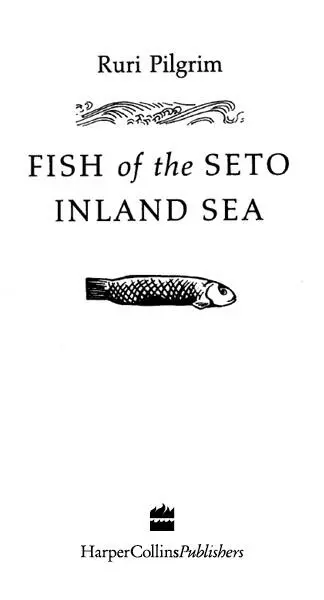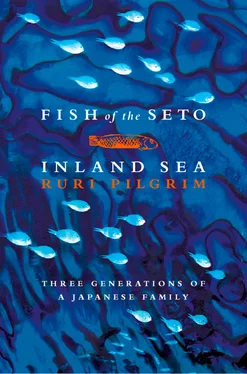
To my Father and Mother
Itsuji and Shizuko Kumoi
This book is about a family whose traditional home is by the Seto Inland Sea in Southern Japan.
There is a saying that the best fish in Japan comes from here because, as is quoted in the book, the rapid flow of water in many places in the sea makes the fish especially firm and good.
These qualities seem to mirror the strength and resilience shown by the three generations of women of the Shirai family.
THE SANJOS (Harukoâs in-laws)
COVER
TITLE PAGE
DEDICATION
PART ONE
1 The Landownerâs Family
2 The Russians
3 Haruko and Her Father
4 Shobeiâs Garden
5 Spring
6 Harukoâs Uncles
7 The Flood
8 Takeko is Seventeen
9 The Maple Tree
10 The Medicine Store
11 The Chief Engineer Sanâs Friend
PART TWO
12 To Manchuria
13 The Farewell Party
14 The City of Acacia
15 Gathering Clouds
16 Bamboo Spears
17 The Summer of 1945
18 The Chinese and the Russians
19 A Journey to Chenyang
20 Survival
21 Going Home
PART THREE
22 The Ruined City
23 The Ming Dish
24 Struggle
25 Kei, Her Sons and Daughter
26 The Sisters
27 Ayako and Her Daughters
28 A God to Rescue You
29 For Better Times to Come
GLOSSARY
AUTHORâS NOTE
ACKNOWLEDGMENTS
ABOUT THE AUTHOR
COPYRIGHT
ABOUT THE PUBLISHER

1
The Landownerâs Family
Shobei Miwa was a rich landowner. His land spread far beyond the village of Takao. He could walk from his house for about forty minutes to the nearest railway station without stepping on anyone elseâs land. In fact, it was Shobei who had sold the land for the railway and station to the government.
Shobei Miwa had two sons, Shintaro and Rinji. His elder son, Shintaro, was sent to Tokyo at the age of fourteen before the railway had been built. He was accompanied by a servant and walked on the trunk road to Tokyo, taking nearly a month. The servant carried his money, including his school fees, in a bundle firmly tied around his waist which he did not take off even when he slept at night. The rooms of the inns had sliding doors and no locks. There were many thieves. The young master and his servant kept to themselves but at the same time had to take care not to look too cautious and attract attention.
When they reached the Oigawa river, the servant would not trust the boatmen and he crossed the river carrying Shintaro on his shoulders. In the middle of the river, the water came up to his chest. Every year, until the railway was built, he made the same trip to Tokyo bringing Shintaroâs expenses.
Shobei was not much worried about how Shintaro lived as a student. When a rumour reached him that Shintaro was drinking heavily, Shobei laughed and said, âA man who cannot drink cannot succeed in life.â
He was generous about his sonâs expenses as well. âLet him have a good time. One can never be young again.â He was concerned only about one thing. This was that Shintaro should come home without getting seriously involved with a woman. Shobei was anxious that his son should marry a girl from a good family known to everybody around them.
âOccasional relaxation from hard work is necessary, but you must remember to honour your obligation to your family,â Shobei wrote to Shintaro in every letter. Shobeiâs letters were written with brush and ink and were difficult to decipher but Shintaro knew the last few sentences without reading them.
Imperial University students were considered to have good prospects and were targeted by ambitious mothers with unmarried daughters, but Shintaro returned to his fatherâs village, Takao, without mishap. With Shobeiâs influence, Shintaroâs future was promising. It was as the director of a new hospital, the largest in the area, that he began his professional life. He was considered the most eligible bachelor for several counties.
Who would be the lucky girl? People speculated. There were many young ladies of suitable families. Relatives and friends were busy sounding out the possibility of a match with girls they knew or had heard about. Parents who had daughters of the right age called on people who knew the Miwas to impress their names on them. The hospital was visited by more young girls, taken by their mothers or maids with minor complaints.
Shobei rejected these proposals one after another without even telling Shintaro.
âThank you for your concern, but he has been away so long and has just started his career. It is important for him to concentrate on his work at the moment,â was his stock reply to every one, although Shobei knew that they were well aware it was not true.
âWhat is he scheming for his sonâs marriage? Is he thinking of marrying Dr Shintaro to a noblemanâs daughter?â People talked. It was generally believed that the real reason was that the girlsâ families were not considered good enough.
When Shobei refused a proposal from the Abes, a family richer and older than the Miwas, Shobeiâs wife confronted him for the first time.
âExcuse me, but Shintaro san is over thirty now. I would like to ask you what is in your mind. Shintaro san will end up as a bachelor because you are ...â She wanted to say âfastidiousâ but said, âWell, because you are too careful.â
âWe cannot have Abeâs daughter.â Shobeiâs answer was categorical.
His wife persisted. âBut may I ask why? They say she is pretty and we have heard nothing against her. The family, of course, is beyond criticism.â
âShe might be acceptable, but she has two brothers.â
âBut itâs good that she has brothers. What is wrong with that?â
His wife was mystified. If the family did not have sons, the girl had to stay at home and take a husband into her family to carry on the family name. She could not marry out. That was how the family line was kept. The system was called yohshi , adoption.
âAbeâs sons are lazy and stupid. The younger one is mean as well.â
âI am sorry, but please explain what you mean. If you worry about everybody in the family, you will always find someone who is not perfect. Shintaro san is not marrying her brothers.â
âHer brothers may be no problem while the father is alive. But wait till the sons have a chance to control the family affairs. At first they will sell a bit of land away from home to pay off their gambling and womanising debts. Gradually they will get deeper and deeper into debt. The brothers will quarrel. After ten years, there will be nothing left. They will come to Shintaro to borrow and so on. Shintaro will have to be involved. Not only is he a kind fellow but he cannot stand by while his in-laws ruin themselves. The bad name of his wifeâs family would spoil the name of the Miwas.â
âI see. Well, I hope Shintaro san will be able to marry one day.â
âOf course he will marry.â
Читать дальше














